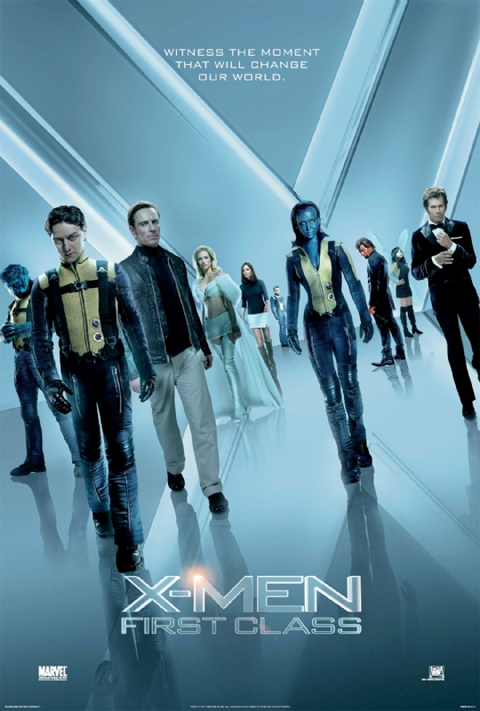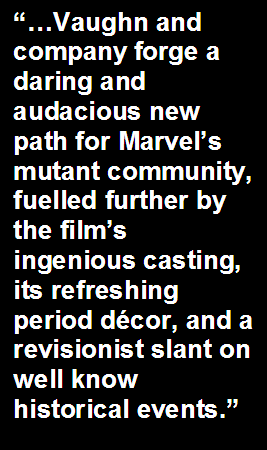A film review by Craig J. Koban June 14, 2011
X-MEN: FIRST CLASS ![]() ½
½
Xavier: James McAvoy / Erik/Magneto: Michael Fassbender / Moira:
Rose Byrne / Raven/Mystique: Jennifer Lawrence / Emma Frost: January
Jones / Hank/Beast: Nicholas Hoult
Directed by Matthew Vaughn / Written by Ashley Edward Miller, Zack
Stentz, Jane Goldman and Vaughn.
 The one aspect that
made the original three X-MEN pictures so uniquely intriguing to me was its handling of its main villain.
The one aspect that
made the original three X-MEN pictures so uniquely intriguing to me was its handling of its main villain.
Erik Lehnsherr,
aka Magneto (played memorably by Sir Ian McKellan) was not a black and
white antagonist that instantly invited our spite and hatred.
He was a rigidly atypical bad guy in the sense that he came across
as a character whose evil motives were deeply rooted in
childhood trauma. A victim of
the Holocaust as a child in Poland, Lehnsherr
was separated from his parents by the Nazis and, worse yet, was put
through tortuous tests by their scientists because of his mutant abilities
to manipulate all forms of metal. As
an adult he wanted “his kind” to live without being suppressed
like he and his family were in WWII.
Yes, Magneto may have committed crimes against
humanity in X-MEN I through III, but
those films at least generated an odd level of understanding and sympathy
for him, which is rare when it comes to comic book villains hell bent on
world domination. Lehnsherr
had his own hateful emotional wounds that allowed him to rise far above the
simplistic moniker of a moustache-twirling maniac.
It’s been this
series’ handling of its villain - and the intriguing thematic handling
of its heroes as well - that has made X-MEN stand apart from other Marvel
Comics spandex heroes. We had a villain that wanted freedom for his mutant brothers
via an aggressively violent approach to eradicate humanity.
The mutant heroes, on the other hand, led with a much more passive
aggressive approach by Charles Xavier, wished to protect and save humanity
from the likes of Magneto, even when it appeared that people wanted nothing
to do with mutants of any kind on any level.
People look up to, say, Superman and Spider-man, but when it comes
to The X-Men no one seems welcoming of them with open arms.
The first X-MEN
film did a good job of introducing us to this film universe and the
second entry – the best of the trilogy – did an even better job of
expanding upon it. The third
entry, yes, was the least of the series, but it still maintained my
genuine interest in the underlining material, not to mention that it
married its involving and compelling characters and story with cutting
edge visual effects.
After a
sensationally realized prologue – set in a WWII Nazi Concentration Camp
and performed all in subtitled German, a first perhaps for super hero
films – X-MEN: FIRST CLASS jumps forward to JFK-era America in 1962 when we are introduced to a much younger version of Charles Xavier (James
McAvoy) a peace-minded, but flirtatious and woman-hungry young scholar
that is on the cusp of getting his PhD and reaching the peak of his
telepathic abilities. Xavier
(as played with dignity and calm spoken bravado by Patrick Stewart
beforehand)
is still a man of intellect, but he now has a cockiness and socially extroverted
side never before hinted at. He
becomes a person of interest for CIA operative Moira MacTaggert (the
lovely Rose Byrne) who wishes to recruit him to help assemble a group of
fellow mutants to battle against an ageless ex-Nazi named Sebastian Shaw
(Kevin Bacon, a wonderful off-centered casting choice) who has the power to absorb
energy, but also wishes to conspire with nations of the world to blow each
other up into nuclear oblivion.
Interestingly,
Shaw seems to be the same man that tortured poor Erik Lehnsherr as a child
under Nazi rule decades ago, so when Erik becomes a handsome, debonair, and
vengeance fuelled adult (Michael Fassbender) his only wish is to hunt Shaw
and kill him. He ultimately
crosses paths with Xavier and the CIA, and the newly anointed Professor
sees potential in having Lehnsherr as a powerful ally.
Yet, for as close as Xavier and Lehnsherr become as partners with
mutual goals, it is their differing attitudes towards mankind in general
that ultimately leads to their falling out.
Before that, though, both of them and their newly acquired team of
misfit X-Men must race against time in order to stop Shaw and, of all
things, prevent the Cuban Missile Crisis from occurring.
|
|
Much like the WATCHMEN, X-MEN: FIRST CLASS is cleverly scripted for how it amalgamates
fantasy and history with real assurance.
Moreover, FIRST CLASS gets considerable mileage out of its
incredibly hip and infectious 1960’s detail, which more than echoes the
kind of retro-cool sophistication one gets from watching a Connery-era
James Bond film. It also
manages to provide a new portal into the lives and world that these
eclectic characters reside in, which consequently gives the film a sense
of new character dynamics and an unexpected energy. Like great reboots, FIRST CLASS subverts our comprehension of
the X-MEN mythos, which is what this series needs.
Of course, the
visual sheen and the bravura special effects are here in abundance again
(helmed by John Dykstra, who worked on STAR
WARS and the first SPIDER-MAN
film) and they pack a predictable and satisfying wallop (we get a stunningly
and thanklessly envisioned look at Cold War America alongside, for
example, incredible shots of Magneto attempting to lift submarines from
underwater). Yet, one of the
chief and memorable success of FIRST CLASS is with its impressive casting
coup of getting McAvoy and Fassbender, unlikely choices, but ones that
breathe with an intense and invigorating suaveness, sure-fire spontaneity, youthful
edge and whimsy, and gravitas to their respective roles.
McAvoy’s take on
the unusually hairy and non-wheelchair prone Xavier is both playful (he sure likes
the ladies) and solemn: he’s a joyful and freethinking Brit with
enthusiasm, compassion, and a sense of duty while also having naïve
insecurities and doubts. Fassbender, on the other hand, makes the most striking
impression as Lehnsherr. The
German born and Irish raised actor has emerged as one of the finest
performers working today: he gave one of the most memorable performances
perhaps of recent memory in HUNGER, was a
dashing rogue in INGLOURIOUS BASTERDS,
and also helmed a layered and tricky role in FISH
TANK. As Magento he
is able to harness this man’s steadfast dedication for revenge (he
occupies the film’s most memorable sequences involving him traveling
through Europe and America while coldly executing former Nazis) while
simultaneously embodying not only his extremist philosophies, but also a
sense of lifelong anguish. We
feel for Magneto because of his past even though we admonish his treatment
of humans in the present. One thing is
clear: Fassbender’s erratic intensity and edge as Magneto is FIRST
CLASS’ finest accomplishment. He,
along with the virtuoso casting of McAvoy, gives the film a striking
one-two punch that hopefully will spill over into future installments.
Kevin Bacon is
also an offbeat bit of casting for a film like this; he seems
completely game and up to the task of playing a highly fashionable and
gentlemanly criminal right out of the Bondian catalogue.
Recent Oscar nominated actress Jennifer Lawrence – so rock solid
and poised in WINTER’S BONE –
rounds off the film’s inimitably diverse cast as a youthful Mystique,
and she does a commendable job of relaying her deep insecurities about her
abilities and place in the world. I
only wished that the other female roles were developed as well: Rose
Byrne’s take as a CIA operative is decent, but forgettable (the script
sort of betrays her character by making her appear and disappear whenever
convenient) and MAD MEN’s January Jones may be pitch-perfect as her
small screen 60’s era housewife, but here she’s lethally stiff and
wooden as the blond-sex pot femme fatale mutant teamed up with Shaw.
She is an absolutely alluring physical presence, but as an actress
here she is an empty emotional vessel.
X-MEN: FIRST CLASS
has other issues, too: Like its predecessors, the film perhaps has too many side-characters (like the
teenage X-Men team members) to have time to fully invest in and develop.
Balancing the film’s dense supporting cast alongside all of its
subplots becomes more problematic as the main story progresses.
And, upon modest scrutiny, Shaw’s main plan for global domination
– which involves spear-heading the Cuban Missile
Crisis and all out World War III – does not seem that logically
envisioned. How ultimately
fulfilling would it be, for instance, to rule a planet void of humans and
a planet that has been devastated by Nuclear Armageddon?
Alas, those are
just small grievances, because X-MEN: FIRST CLASS is wholeheartedly a
grand surprise: it’s uncommonly well acted, cleverly produced, and
shrewdly written and directed. Filmmaker
duties fell this time to Matthew Vaughn, replacing the unavailable Bryan
Singer, whose strong handling of the satiric super hero film KICK-ASS
more than makes him adept at injecting some much needed novelty into the
X-MEN
universe. Instead of taking a
franchise that could have become tediously dull with another sequel,
Vaughn and company forge a daring and audacious new path for Marvel’s
mutant community, fuelled further by the film's ingenious casting, its
refreshing period décor, and a revisionist slant on well know historical events.
FIRST CLASS is certainly not as dramatically absorbing and darkly
textured as THE DARK KNIGHT, nor
is it as thrillingly enjoyable as SPIDER-MAN 2, IRON
MAN 1, or THOR, but it certainly
embarks on a judiciously bold new path for the X-MEN, and is certainly –
and unpredictably – one of the best films of the entire series thus far.
| REVIEW ADDENDUM |
X-MEN: FIRST CLASS contains a
blink-and-you'll-miss cameo that just may be one of the best and
unexpectedly funny cameos in an awfully long time.

